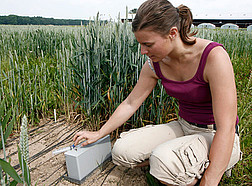The training program in plant technology takes 2 to 3 years to complete and is a typical apprenticeship within Germany's dual system of vocational training. Trainees sign a training contract with their employer and attend vocational school (in blocks) at Bundesfachklasse Einbeck.
In the remaining time, practical skills are learned at the "Heidfeldhof" Agricultural Research Station and at the State Plant Breeding Institute. If you have passed the Abitur or the Fachhochschulreife or an excellent intermediate examination, the training can be shortened to 2 years.
Work areas at the research stations:
- Field studies
- Greenhouse
- Seeds
- Research laboratory
- Breeding nursery
Trainees have to go through at least two of these areas during their training program.
- Planting, growing, and harvesting crops for the purpose of experimentation and multiplication
- Operating precision machines/experimental equipment for precision experiments in the field
- Identifying dry substances, 1,000 kernel weights, case numbers, and ingredients in the laboratory
- Applying breeding and multiplication methods
- Collecting and analyzing samples
- Documenting, analyzing, presenting, and communicating results - per computer, of course
- Organizing work procedures
During their training, trainees attend in-house seminars to supplement their vocational school education and to enhance their hands-on learning.
- In the second year of training, trainees take an intermediate examination (written and practical).
- The written and practical final examination takes place at the end of the training program.
The examinations have to be taken at Bundesfachklasse Einbeck.
Trainees who completed their training can only be hired by the University if vacant positions are available. Plant technologists work at public institutions and private companies specializing in plant breeding, plant experimentation, and plant multiplication, as well as agricultural and horticultural research labs.
Trainees are currently paid:
- € 1,086.82 in the first year of training
- € 1,140.96 in the second year of training
- € 1,190.61 in the third year of training
On 1 November 2024, the amounts will increase by a fixed sum of EUR 100, and on 1 February 2025 by a further fixed sum of EUR 50.
Requirements for applying are: a driver’s license class B (for cars) and no allergies, especially pollen and dust allergies. A certain amount of physical stamina is required.
Applications can be sent within the application period (one year before the apprenticeship starts)
Documents
- Application letter
- CV
- Copies of your last two school report cards (semester and annual report cards),
- if applicable, proof of professional activity or internships
Application procedure
or
- by post to
Prof. Thomas Miedaner
Universität Hohenheim
LSA 720, Arbeitsgebiet Roggen
[Wiss. Leitung]
Fruwirthstr. 21
70593 Stuttgart
Interview
Selected applicants will be invited to an interview and for a trial phase lasting several days so they can get to know the area in which they will work.
After completion of the selection process, all application documents are destroyed in accordance with data protection regulations.

